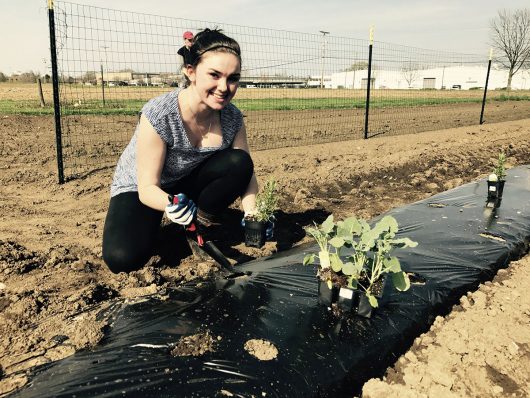
Maggie Griffin, a third-year in social work plants vegetables at Ohio State’s Waterman Farm where she plans to grow a community garden to service local families affected by food insecurity. | Credit: Courtesy of Maggie Griffin
When Maggie Griffin, a third-year in social work, learned about food insecurity in central Ohio, she began envisioning solutions to provide local children and families with access to fresh fruits and vegetables.
“I just was shocked about how this lack of access was affecting our community, and it was terrible,” she said. “I was learning all these facts about how (hunger) started so young and how these kids didn’t have a chance to start, because of something so simple as a lack of access to food.”
Griffin’s knowledge of the problem ultimately led to the creation of the Unity Fridge Program, an idea that enabled her to win one of the two inaugural President’s Prizes, awards consisting of $50,000 to be put toward the implementation of students’ ideas, plus a $50,000 living stipend.
Griffin’s proposed program would place outdoor refrigerators in strategic locations in nearby food deserts — areas that have little access to fresh and healthful foods — giving local families access to produce that Griffin intends to grow in a community garden at Ohio State’s Waterman Farm.
She plans to use some of the prize money to purchase initial tools and supplies, such as the refrigerators, seeds and planting equipment. The other half of the award will be used to pay her salary.
However, the program is not only about giving children and families access to fresh produce, Griffin said. Rather, she said she sees the garden as a family-friendly space with picnic tables and lending libraries that can connect OSU to the surrounding Columbus community.
“It’s about teaching and building a bond that lasts longer than this program,” she said. “And I think the community that can come out of that is incredible.”
She hopes to focus the program on children, she said, because of the effects malnutrition can have on a child’s development and because Griffin sees greater potential to make a significant difference by working with youth.
“If I can make a change when they’re young, I can create a longer-lasting change for them,” Griffin said. “Not only will I give them food, but I want to give them the tools to sustain (healthy habits) in their lives.”
To maintain the garden and grow fresh food, Griffin plans to partner with various student organizations. She said she also hopes students will be willing to work with the children and families receiving the produce, teaching them about how the food is grown and cared for.
“It’s more than about food,” said Michelle Kaiser, Griffin’s project adviser and an assistant professor with the College of Social Work. “(Griffin)’s approach is really about building relationships. I think there is a great potential for the exchange of ideas from both the participants and the volunteers who are working on the garden, in terms of sharing recipes and gardening ideas. There’s lots of things that can result from having conversations.”
Griffin said she sees the Unity Fridge Program as her chance to make a change by connecting the community.
“Large scale change doesn’t happen with one person or one story,” she said. “It’s a community, and it’s people coming together because they see an injustice about an issue.”
The Engaged Scholars logo accompanies stories that feature and examine research and teaching partnerships formed between the Ohio State University and the community (local, state, national and global) for the mutually beneficial exchange of knowledge and resources. These stories spring from a partnership with OSU’s Office of Outreach and Engagement. The Lantern retains sole editorial control over the selection, writing and editing of these stories.



